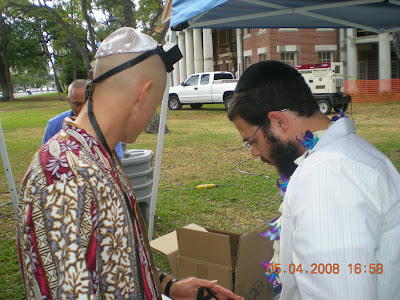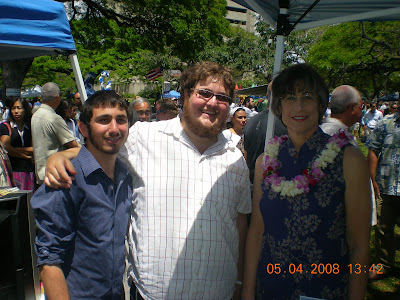The Guam Jewish community is receiving a visit from two rabbis.
Visiting rabbis: Rabbi Shmulie Hecht, left, and Rabbi David Loksen at the Pacific Islands Club Resort garden on July 31. (Vuong Duong/For Pacific Daily News)
Rabbi David Loksen and Rabbi Shmulie Hecht, of the Brooklyn, New York-based Chabad Lubavitch Jewish Community Enrichment Program, are currently volunteers with Chabad Hawaii, which sponsored their visit to the island.
Rabbi Loksen said the goal of the organization is to reach out to Jewish communities across the globe.
"Following World War II, (Jewish people) scattered all over the world," said Loksen. "It is the mission of the Lubavitch to reach out to them and bring them back into the faith."
The rabbis arrived July 22 and will be leaving Aug. 12.
Loksen said the rabbis have been doing house visits so far.
"We've been putting up mezuzahs, what you call a 'Jewish security system,'" he said.
A mezuzah is a scroll placed on the door frame of a home containing verses from the Old Testament. The article serves as a reminder of the lamb's blood Jews in ancient Egypt used to mark their doors for protection.
"We go to homes and teach them about Jewish heritage, about the Torah," said Loksen. "We answer any concerns they may have as Jews."
"There's been a lot of discussion, a lot of shmoozing," said Hecht.
The rabbis held a Sabbath service Friday at the Pacific Islands Club Resort.
Dr. Joel Joseph, a Jewish community leader on Guam, said there are currently no rabbis on island to tend to the needs of the Jewish community.
"Hopefully, we're going to have a naming ceremony or two," said Joseph, who said the ceremonies entail religious services relating to newborn children.
With no resident rabbis on island, Joseph said he's acted as a community stand-in since his arrival.
"There was a funeral, unfortunately, not long after I arrived on island," said Joseph. "No one knew the prayers, but I did, since I attended religious school."
Hecht said it is possible the Lubavitch may assign a permanent rabbi to Guam, "depending on the needs of the community."











































